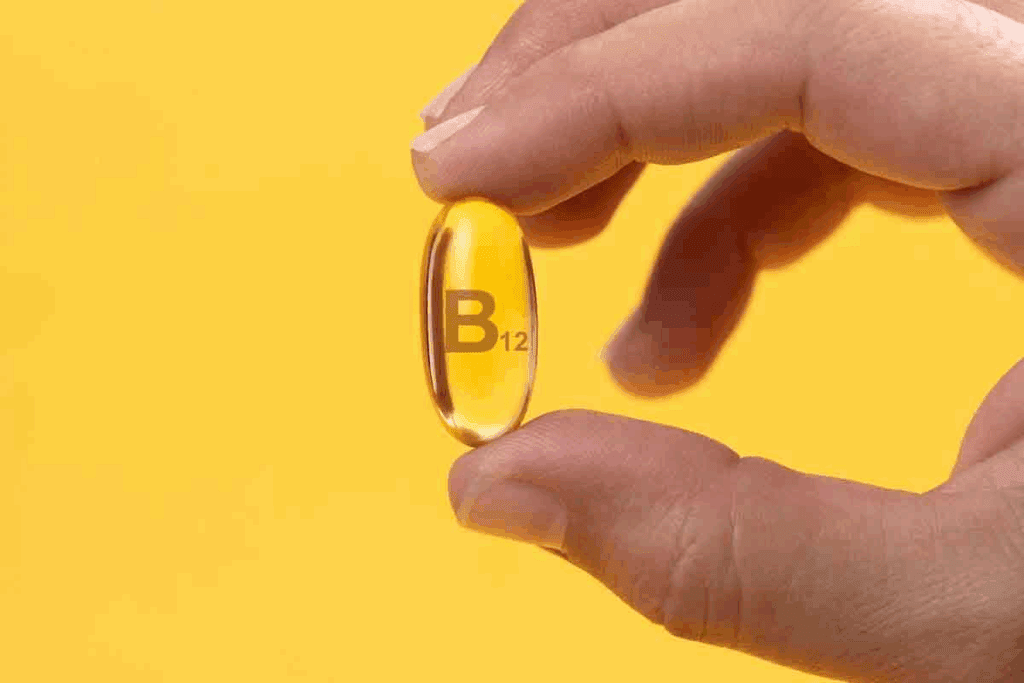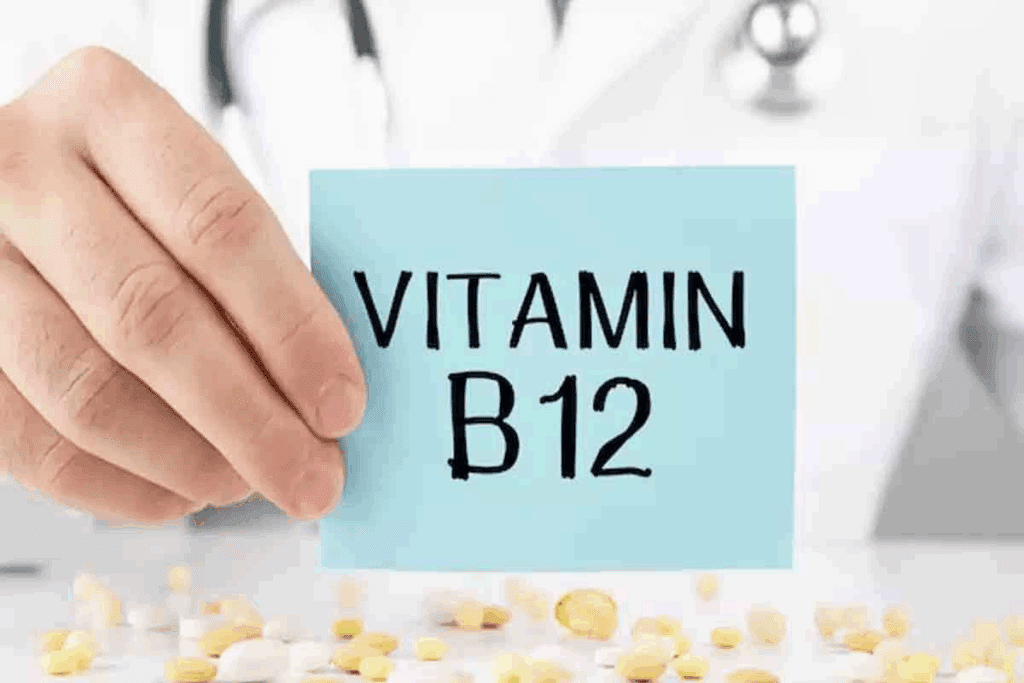Last Updated on November 17, 2025 by Ugurkan Demir

At Liv Hospital, we know how important it is to tell the difference between folate and vitamin B12 deficiencies. Both are key for making red blood cells and keeping our nervous system healthy. But they play different roles in our bodies. Many people wonder, “is folate the same as B12?” The answer is no — while they work together, they are distinct vitamins with unique functions.
A lack of either vitamin B12 or folate can cause anemia, but the signs and reasons can be quite different. Knowing these differences helps us treat it right and ensure each patient gets the right care.

Folate and Vitamin B12 are key for our bodies to work right. They help make red blood cells and keep our nerves healthy. Let’s dive into what they do and why they’re important.
Folate is a B vitamin that helps make DNA and grow cells. It’s vital for avoiding folate anaemia. This condition makes you feel tired, weak, and short of breath because of too few red blood cells.
Vitamin B12 is key for making red blood cells, keeping nerves healthy, and making DNA. Not having enough Vitamin B12 can cause vitamin B12 and folic acid deficiency anemia and other health problems.
Vitamin B12 and folate work together in the b12 folate iron metabolic pathway. This pathway helps the body carry oxygen and keep nerves healthy.
It’s important to know how folate and Vitamin B12 work separately and together. They’re all connected to iron and folate deficiency. All three are important for making healthy red blood cells.

Folate and vitamin B12 are both important B vitamins. But they are not the same and serve different roles in our bodies. Knowing how they differ is key to diagnosing and treating any deficiencies.
Folate and vitamin B12 have different chemical makeup. Folate, also known as vitamin B9, is a water-soluble vitamin. It includes folic acid and its derivatives. On the other hand, vitamin B12, or cobalamin, is a complex compound with a cobalt ion at its center. This difference in structure affects how they work in our bodies.
Both folate and vitamin B12 are vital for DNA synthesis and repair. They also help in the metabolism of fatty acids and amino acids. But vitamin B12 is special because it helps in the production of red blood cells and the maintenance of the nervous system. Folate is key in preventing megaloblastic anemia, a condition where red blood cells are too big.
Even though they share some similarities, folate and vitamin B12 have big differences. Vitamin B12 is needed for the synthesis of myelin, the fatty substance around nerve fibers. Folate, on the other hand, is important for cell division and growth. It’s important to understand these differences to diagnose and treat deficiencies correctly.
Folate deficiency can happen for many reasons. These include not eating enough folate, certain health issues, and some medicines. We’ll look at each reason to understand how they cause folate deficiency.
Eating foods low in folate can lead to deficiency. Foods high in folate are leafy greens, legumes, and fortified cereals. People who don’t eat enough of these foods are more likely to be deficient.
Nutritional habits are key to keeping folate levels up. For example, eating too much processed food, which lacks nutrients, raises the risk of folate deficiency.
Some health issues can make it hard for the body to absorb folate. Conditions like celiac disease, Crohn’s disease, and ulcerative colitis harm the small intestine. This is where folate is absorbed, leading to deficiency.
Also, people with gastrointestinal disorders might not absorb folate well. This makes them more likely to have folate deficiency.
Some medicines can mess with folate levels. This includes anticonvulsants, methotrexate, and certain antibiotics.
It’s important for people on long-term meds to watch for folate deficiency. Medication-induced deficiency can harm health if not treated.
It’s important to know why Vitamin B12 levels drop. This vitamin is key for making red blood cells, keeping nerves healthy, and making DNA. Without enough, our bodies can’t work right.
What we eat can lead to Vitamin B12 deficiency. This vitamin is mainly in animal products like meat, fish, and dairy. People who don’t eat these, like vegetarians and vegans, are at risk.
Vegans and vegetarians need to watch their Vitamin B12 intake. Not getting enough can cause serious health problems. Eating fortified foods or taking supplements can help.
Some health problems make it hard for the body to absorb Vitamin B12. Pernicious anemia is one, where the body can’t make the protein needed for absorption. Other issues like Crohn’s disease and some surgeries also cause problems.
For more on why Vitamin B12 levels drop, check out NHS.uk.
Getting older can also affect Vitamin B12 levels. As we age, our stomachs make less acid and intrinsic factor. These are needed to absorb Vitamin B12 from food. So, older adults are more likely to have a deficiency.
Vitamin B12 deficiency comes from many sources, like diet, health issues, and aging. Knowing these causes helps us prevent and treat it. By understanding why levels drop, we can keep our Vitamin B12 healthy.
Knowing the signs of folate deficiency is key to staying healthy. Folate helps make red blood cells, DNA, and keeps our nervous system working right.
The first signs of folate deficiency might be small and not seem serious. But, they can be important. Look out for:
If folate deficiency isn’t treated, it can get worse. Severe symptoms include:
Folate anemia shows up with specific symptoms that can really affect your life. Key symptoms are:
Spotting these symptoms early is vital for managing folate deficiency. Seeing a doctor for a proper diagnosis and treatment can really help.
Knowing the signs of Vitamin B12 deficiency is key to catching it early. This vitamin is vital for making red blood cells, keeping nerves healthy, and helping DNA. Without enough, you can face many health problems.
Vitamin B12 affects the nervous system a lot. Symptoms include:
Vitamin B12 helps make myelin, which protects nerve fibers. Without it, nerves can’t function well.
Vitamin B12 also impacts blood health. Symptoms include:
A lack of Vitamin B12 can cause megaloblastic anemia. This is when red blood cells are too big and don’t work right.
Vitamin B12 deficiency also affects the mind. Symptoms include:
Spotting these signs early is important. Untreated, Vitamin B12 deficiency can harm your nerves for a long time.
It’s important to know how Vitamin B12, folate, and iron work together. Deficiencies in these can harm your body more. Recognizing Vitamin B12 deficiency symptoms is a big step in treating related health problems.
Knowing how to diagnose vitamin B12 and folate deficiencies is key to better patient care. Doctors use a mix of clinical checks and blood tests to find these issues. Blood tests are mainly used to see how much of these vitamins are in the blood.
Blood tests are the main way to spot vitamin B12 and folate shortages. These tests check the blood levels of both vitamins. This helps doctors figure out if a person is lacking these nutrients.
Interpreting Blood Test Results: It’s important to know what blood test results mean. For vitamin B12, levels under 200 pg/mL show a deficiency. Levels between 200-300 pg/mL are borderline. For folate, levels under 4 ng/mL are considered low.
One big challenge is when folate supplements hide a vitamin B12 shortage. High folate can fix the anemia caused by B12 lack but doesn’t fix the brain damage.
Testing both vitamins at the same time is very important. It helps spot when folate is hiding a B12 problem.
How doctors diagnose vitamin B12 and folate shortages differs in the US and UK. In the US, doctors often use a complete blood count (CBC), vitamin B12, and folate tests. In the UK, they also check for methylmalonic acid (MMA) to confirm B12 deficiency.
Here’s a table that shows the main tests and what they mean:
| Test | Normal Range | Deficient Range |
| Serum Vitamin B12 | 300-900 pg/mL | <200 pg/mL |
| Serum Folate | 4-20 ng/mL | <4 ng/mL |
| Methylmalonic Acid (MMA) | <0.4 μmol/L | >0.4 μmol/L |
It’s important to know how B12, folate, and iron work together. These nutrients help make red blood cells and keep our nervous system healthy.
Vitamin B12, folate, and iron are key for our body’s functions. Vitamin B12 helps make red blood cells and keeps nerves working. Folate is needed for DNA repair, and iron is essential for hemoglobin, which carries oxygen.
Not having enough of one nutrient can affect the others. For example, not enough vitamin B12 can cause folate deficiency. Iron deficiency can make folate and B12 deficiencies worse for making red blood cells.
Not having enough B12, folate, and iron can harm our health. Iron deficiency anemia can get worse with folate and B12 deficiencies. This can lead to more fatigue, weakness, and nerve problems.
| Nutrient | Role in the Body | Deficiency Effects |
| Vitamin B12 | Red blood cell production, nerve function | Anemia, neurological symptoms |
| Folate | DNA synthesis and repair | Anemia, fatigue, weakness |
| Iron | Hemoglobin formation | Anemia, fatigue, weakness |
Healthcare providers need to understand how these nutrients interact. This helps them treat deficiencies better. By focusing on the connection between B12, folate, and iron, we can help patients with complex nutritional issues.
Not treating folate and vitamin B12 deficiencies can cause serious health problems. These nutrients are vital for our bodies. Their lack can show in many ways.
Short-term, not having enough folate and vitamin B12 can make you feel fatigued, weak, and anemic. These symptoms can make daily tasks hard. Also, you might get gastrointestinal issues like diarrhea and lose your appetite.
Vitamin B12 deficiency can also cause neurological symptoms like numbness and tingling in your hands and feet. Folate deficiency can make you feel moody and irritable. These short-term problems can really hurt your quality of life.
Ignoring these deficiencies for a long time can lead to long-term neurological damage. Vitamin B12 deficiency can cause permanent nerve damage and cognitive decline. Folate deficiency can also harm your neurological health, even if it’s not as direct.
It’s key to catch these deficiencies early and treat them. Keeping an eye on b12 folate levels helps avoid these problems. Knowing the risks helps you stay healthy.
Managing folate and vitamin B12 deficiencies needs a full plan. This includes supplements, diet changes, and regular check-ups. We’ll look at how these steps can meet individual needs.
Supplements are key in treating these deficiencies. For folate, folic acid supplements are usually given. For vitamin B12, cyanocobalamin or methylcobalamin are often suggested.
Choosing between pills and injections depends on the deficiency’s severity and how well the body absorbs the vitamin. For example, vitamin B12 injections are better for those with severe absorption problems.
Eating a balanced diet is important for managing and preventing these deficiencies. Eating foods rich in folate like leafy greens and fortified cereals helps keep folate levels up.
To get enough vitamin B12, it’s important to eat animal products like meat, fish, and dairy. Vegans might need extra supplements.
| Nutrient | Food Sources | Recommended Daily Intake |
| Folate | Leafy greens, fortified cereals, legumes | 400 mcg |
| Vitamin B12 | Meat, fish, dairy products, fortified plant-based milk | 2.4 mcg |
Regular blood tests are important to see if treatment is working and to catch any problems early. This helps prevent the deficiency from coming back.
Seeing your healthcare provider regularly is also key. It lets them adjust your treatment plan as needed to make sure you’re getting enough nutrients.
It’s important to know the difference between folate and vitamin B12 deficiencies. Both vitamins are key for our bodies, but they are not the same. Their deficiencies show different symptoms.
Folate and vitamin B12 are important together for making red blood cells and keeping our nervous system healthy. But, is folate the same as b12? No, they are not the same because they have different structures and roles.
To diagnose b12 & folate deficiencies, we must look at vitamin b12 folate levels carefully. Treating a B12 deficiency with folate might help some symptoms but miss others.
Knowing the signs of folate or b12 deficiency is vital for early treatment. This way, doctors can give the right treatment, helping patients get better faster.
In short, we stress the need for accurate diagnosis and treatment of folate and vitamin B12 deficiencies. This approach helps avoid serious problems and improves life quality for those affected.
Folate and vitamin B12 are both important for making red blood cells and keeping the nervous system healthy. But they do different jobs in the body. Folate helps with DNA and repair, while vitamin B12 is key for fatty acids and energy.
Folate deficiency can happen for many reasons. It might be because of a diet low in folate, certain diseases like celiac, or some medicines that block folate absorption.
Vitamin B12 deficiency symptoms can vary. They might include numbness and tingling, anemia, and memory loss. These symptoms can affect the nervous system, blood, and brain.
Doctors use blood tests to find folate deficiency. These tests check folate levels in the blood. They help doctors know if treatment is needed.
Yes, high folate levels can hide vitamin B12 deficiency symptoms. It’s important to test for both folate and vitamin B12 to diagnose correctly.
Vitamin B12, folate, and iron are all vital for making healthy red blood cells. Not having enough of any can cause anemia and other problems. When several are lacking, the effects can be worse.
Not treating folate and vitamin B12 deficiencies can cause short-term issues like anemia. It can also lead to long-term damage, like nerve damage and brain problems.
Treatment for these deficiencies includes supplements and eating more foods rich in folate and vitamin B12. Regular check-ups are also key to make sure the levels are right.
Low vitamin B12 levels are when they’re below a certain point, usually in picograms per milliliter (pg/mL). The exact number can vary based on the lab and the person’s health.
Yes, you can buy folate and vitamin B12 supplements without a prescription. But, it’s best to talk to a doctor first. They can help with the right dose and any possible side effects.
References:
https://www.nhs.uk/conditions/vitamin-b12-or-folate-deficiency-anaemia
Subscribe to our e-newsletter to stay informed about the latest innovations in the world of health and exclusive offers!